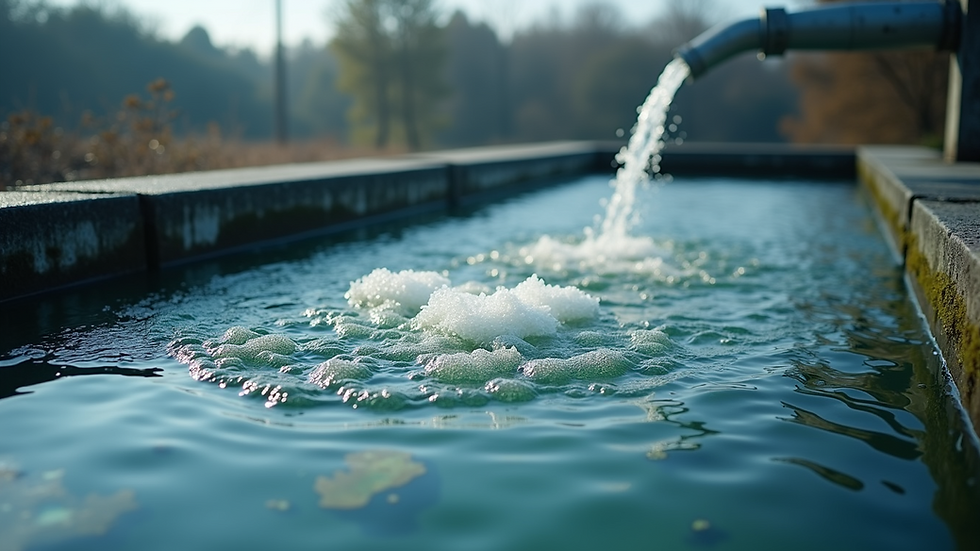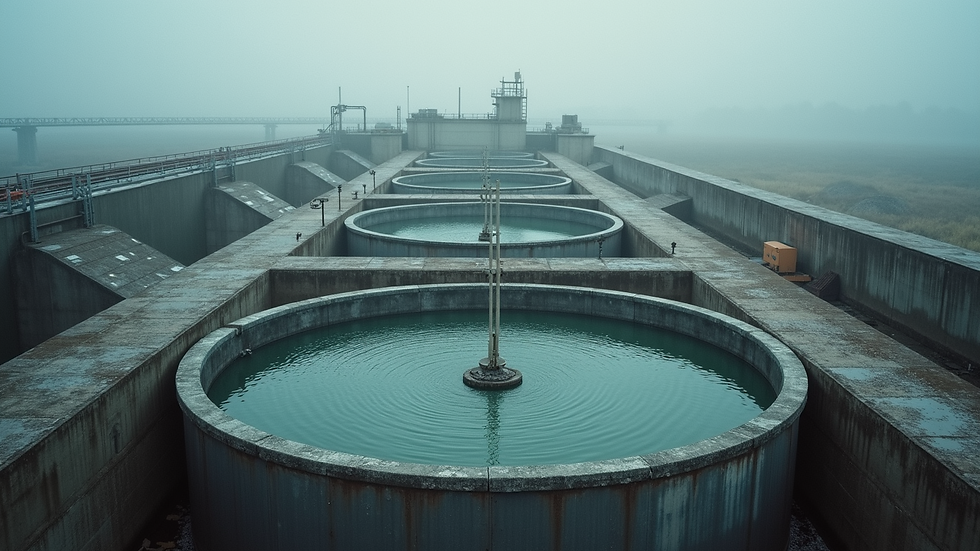Effective Techniques for Industrial Wastewater Management
- palwinder kaur
- Aug 30, 2025
- 4 min read
Industrial wastewater is a significant environmental concern due to the pollutants it contains. Managing this wastewater effectively is crucial to protect ecosystems, comply with regulations, and promote sustainable industrial practices. This article explores various wastewater treatment techniques that industries can adopt to treat their effluents efficiently. By understanding these methods, industries can reduce their environmental footprint and contribute to cleaner water resources.
Key Wastewater Treatment Techniques in Industry
Industries generate wastewater containing a mix of organic and inorganic substances, heavy metals, oils, and chemicals. Treating this wastewater requires a combination of physical, chemical, and biological processes. Here are some widely used wastewater treatment techniques:
1. Physical Treatment Methods
Physical treatment involves removing solids and suspended particles from wastewater. Common physical methods include:
Screening: Large debris such as plastics, rags, and sticks are removed using screens.
Sedimentation: Wastewater is held in tanks to allow heavy particles to settle at the bottom.
Filtration: Water passes through filters to remove smaller suspended solids.
These methods are often the first step in wastewater treatment, preparing the water for further chemical or biological treatment.
2. Chemical Treatment Methods
Chemical treatment targets dissolved contaminants and pathogens. Techniques include:
Coagulation and Flocculation: Chemicals like alum or ferric chloride are added to clump fine particles into larger flocs, which settle out easily.
Neutralization: Adjusting the pH of wastewater to neutral levels using acids or bases.
Oxidation: Using oxidizing agents such as chlorine or ozone to break down organic pollutants and disinfect the water.
Chemical treatments are effective for removing heavy metals, toxic substances, and pathogens.
3. Biological Treatment Methods
Biological treatment uses microorganisms to degrade organic pollutants. Common biological processes are:
Activated Sludge Process: Aerobic bacteria consume organic matter in aeration tanks.
Trickling Filters: Wastewater passes over a bed of media where biofilms break down pollutants.
Anaerobic Digestion: Microorganisms break down organic matter in the absence of oxygen, producing biogas.
Biological methods are cost-effective and environmentally friendly for treating biodegradable waste.

What do you mean by industrial waste management?
Industrial waste management refers to the systematic control of waste generated by industrial activities. It involves the collection, treatment, and disposal of waste materials to minimize environmental impact. This includes solid waste, hazardous waste, and wastewater. Proper management ensures compliance with environmental laws and promotes resource recovery and recycling.
In the context of wastewater, industrial waste management focuses on treating effluents before discharge or reuse. This prevents contamination of water bodies and protects public health. Techniques vary depending on the industry type, wastewater composition, and local regulations.
Advanced Wastewater Treatment Technologies
As environmental standards become stricter, industries are adopting advanced treatment technologies to achieve higher water quality. Some of these include:
Membrane Filtration
Membrane technologies such as ultrafiltration, nanofiltration, and reverse osmosis use semi-permeable membranes to separate contaminants from water. These methods can remove dissolved solids, bacteria, viruses, and even salts.
Advantages: High removal efficiency, compact footprint.
Applications: Pharmaceutical, food processing, and chemical industries.
Electrochemical Treatment
This method uses electrical current to remove pollutants through oxidation, reduction, or coagulation. It is effective for treating heavy metals, cyanides, and organic compounds.
Advantages: No chemical additives required, can be automated.
Applications: Metal plating, textile, and petrochemical industries.
Advanced Oxidation Processes (AOPs)
AOPs generate highly reactive hydroxyl radicals that degrade complex organic pollutants. Techniques include UV/H2O2, ozone, and Fenton’s reagent.
Advantages: Effective for recalcitrant compounds, improves biodegradability.
Applications: Pharmaceutical wastewater, dye industry.

Practical Recommendations for Effective Wastewater Management
Implementing effective wastewater treatment requires a strategic approach. Here are some actionable recommendations:
Conduct Wastewater Characterization: Analyze the composition and volume of wastewater to select appropriate treatment methods.
Implement Source Reduction: Minimize waste generation by optimizing industrial processes and using cleaner production techniques.
Combine Treatment Methods: Use a combination of physical, chemical, and biological treatments for comprehensive pollutant removal.
Regular Monitoring and Maintenance: Ensure treatment systems operate efficiently by conducting routine checks and maintenance.
Reuse and Recycling: Treat wastewater to standards that allow reuse in industrial processes, reducing freshwater consumption.
Train Staff: Educate employees on best practices for wastewater handling and treatment.
By following these steps, industries can improve their wastewater management and reduce environmental risks.
The Role of Technology and Innovation in Industrial Wastewater Management
Technological advancements are transforming how industries manage wastewater. Automation, real-time monitoring, and data analytics enable better control and optimization of treatment processes. Smart sensors can detect pollutant levels instantly, allowing for timely adjustments.
Moreover, innovations in green chemistry and biotechnology are leading to more sustainable treatment options. For example, bioaugmentation introduces specialized microbes to enhance biodegradation, while constructed wetlands mimic natural purification processes.
Investing in research and development can help industries stay ahead of regulatory requirements and reduce operational costs.

Moving Towards Sustainable Industrial Wastewater Solutions
Sustainable wastewater management is essential for long-term environmental health. Industries should aim to:
Reduce pollutant load at the source.
Adopt energy-efficient treatment technologies.
Promote water reuse and recycling.
Engage in continuous improvement and innovation.
By integrating these principles, industries contribute to water conservation and pollution prevention. For more detailed information on effective wastewater treatment techniques, visit industrial wastewater management.
Taking proactive steps today ensures cleaner water for future generations and supports sustainable industrial growth.



Comments